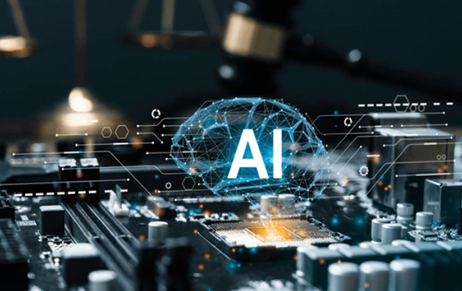In recent years, the world witnessed an exponential surge in the use of Artificial Intelligence…
Challenges and Implications of Ai-Driven Clinical Decision- Making in Healthcare
Information and communication technology (ICT) has become a central component for modern business as it contributes to organization’s functioning and works as the basis for competitive advantage. Today, in the era of Fourth Industrial Revolution, organizations regardless of the industry they belong to are utilizing forms of digital advanced technologies for creating new value. So is the health-care segment, with hospitals and other care delivering institutions across the globe integrating technologies such as, AI & ML, smart sensors, robots, big data analytics & IoT to enhance the quality of care and the effectiveness of delivery.
AI is a computerized system for performing tasks or reasoning which resembles human beings’ intelligence. It has garnered significant attention in the healthcare sector. The many debates regarding the future of AI have pinned for the idea that instead of displacing human physicians, AI operate in a complementary manner. However, the advancement of AI has been slow in application in the health sector because of the challenges that include; complexities, unpredictable nature, and concern for patients’ safety, bias and privacy.
AI systems possess the capability to analyze wide information in areas concerning health from different healthcare professions using algorithm. From this data, they ‘learn’ to help in clinical decision making providing information that enriches a physician’s judgment or may sometimes act as the judgment for some specializations such as radiology. These systems can give the physicians current and accurate medical information from journals, textbooks and other clinical practices helping in the right diagnosis and treatment of the patients as well as minimizing diagnostic and therapeutic mistakes which are common.
This blog explores the diverse applications of AI in healthcare and exploring the challenges associated with its implementation.
Exploring AI Application in Heathcare
The implementation approaches utilized for AI and ML integration within the healthcare domain are presently characterized by their ad hoc nature across various applications. The absence of well-established guidelines and optimal practices results in the formulation of provisional solutions that may not achieve optimal outcomes. However, there is a transformation which can be clearly seen in the core of the industry which has led to implementation of AI based processes which in turn are helping in cutting the costs of the current ventures of the healthcare industry and also helping finding solutions for the future ventures.

The sudden rise in application of these systems in the industry are corelated to instances which happen to shed light on the flaws rather needs of the healthcare industry. The coronavirus pandemic can be termed to be one of these instances. The inevitable costs and lack of access is why there is a need for simplification, establishment and application of AI/ML systems.
There are a handful of sectors that have understood rather realized the need for these systems and the foremost ones are in the Drug and Pharmaceutical sector. AI has notably expedited the drug discovery processes of pharmaceutical companies by automating the identification of targets which initially took up a reasonable amount of time. AI aids in repurposing and reducing repeated work. Leading pharma cooperations have seen to be including ML systems, in collaboration or internally, for research methods like immuno-oncology, metabolic diseases and cancer treatments by studying patters.
An additional aspect to the R&D done by the big pharma, automation of clinical trials can prove beneficial. AI in healthcare contributes to the streamlining of time-consuming data monitoring tasks as AI-supported clinical trials effectively manage vast datasets, yielding highly precise results. In recent years, biopharmaceutical enterprises have gained access to burgeoning volumes of scientific and research data from diverse origins, commonly termed as real-world data (RWD). Nonetheless, they often encounter challenges stemming from insufficient expertise and tools requisite for efficacious utilization of such data. The application of predictive AI models and sophisticated analytics holds the potential to harness RWD effectively, thereby facilitating enhanced comprehension of diseases, identification of pertinent patient cohorts and significant investigators, and the facilitation of groundbreaking clinical trial designs. The easy maintenance and preservation of this data would reduce the amount of error too.
Data management and research is only scratching the surface of what AI and ML have to offer in the industry. AI significantly impacts patient outcomes within the clinical domain. Medical AI cooperations develop systems designed to provide comprehensive assistance to patients across various stages of care. One such major development in AI assistance in the clinical domain is in relation to smart prosthesis which are equipped with sensors that enhance their responsiveness and accuracy beyond those of natural body parts.Additionally, users have the option to encase them in bionic skin and establish connections with their muscles, further augmenting their functionality. Assistance of individuals with such prosthesis can also be done with the help of ML Exoskeletons in order to establish a patter-managed rather self-centred rehabilitation mechanism.
Application of systems in the field of maternal care has the ability of taking into consideration the prediction of at-risk mothers using electronic health data and also using such digital care to judge the frequency of care needed. Furthering upon the ability of AI on personalization of care, the consumers of healthcare have grown to be highly involved in an informed decision making on their medical stand. Data-centric medicine holds promise not only for enhancing the precision and flexibility of genetic disease identification but also for paving the way for personalized medical interventions.
AI harbours the potential to assist healthcare providers across a spectrum of functions, encompassing patient treatment as well as administrative responsibilities in a very personalized manner. AI brings under its umbrella, opportunities of improved treatments, patient participation, improved quality and reduction of errors and costs.
Addressing Challenges in Implementing AI in Medical Delivery System
One cannot deny the plethora of advantages that comes with the application rather implementation of AI and ML in various sectors of the healthcare system. Although AI applications present novel avenues for enhancing daily life, they also introduce challenges that require adept management. Anything new in the market needs to gain trust of the consumers and the same applies as there is a very prominent AI divide. One notable characteristic that sets the healthcare industry apart from other service sectors is the tendency for patients to place unconditional trust in medical personnel. This could be termed as a placebo effect. The trust between physicians and patients is crucial as it enhances the efficacy of treatment and care. This new relationship with AI and the consumers of healthcare can be fostered and strengthened with time.
In cases where trust is compromised, patients may hesitate to share all relevant clinical details, thereby depriving algorithms of the necessary information for diagnostic comparison against their database. This calls for the need to ensure that these AI agents comport in accordance with moral and ethical norms.
Furthermore, since AI-based technologies and systems depend on a massive dataset, issues about privacy arise in collecting and sharing of information. Sharing disease related data has its own set of challenges since the data that has to be shared refers to patient’s personal data. Therefore, the firms that engage in the software development will have to observe the legal requirements of data confidentiality, potentially impeding the pace of AI innovation. With more and more patient records, diagnostic pictures, and genetic data being stored and shared electronically, the probability of data breach becomes one of the major concern. This’s why it is critical to use this highly sensitive information responsibly and protect it in compliance with the law so that citizens stay trustful. The security of these systems becomes an important factor when India is embarking on Digital Health Mission and the use of electronic health records.
Moreover, as AI technology draws possible conclusions based on machine learning from aggregated data, the decision-making process may overlook the unique circumstances of individual patients, thereby raising ethical, moral, and legal concerns.
As AI technologies gain extensive traction within the healthcare sector, care providers are increasingly reliant on the knowledge and guidance of consultants, specialists, and experts. Consequently, healthcare services have evolved into collaborative endeavours involving numerous external and internal professionals. This collaborative approach may lead hospital administrators to perceive a diminishment in their managerial oversight.
Many people think that since AI will be able to analyse diagnostic medical pictures more correctly than humans, radiography as a medical profession may eventually become extinct. Radiologists and pathologists both carry out their specialties in a comparable way. Since both specialties extract medical information from photographs, they are both information-driven. A radiologist may review thousands of pictures from a CT scan of a patient who has suffered multiple trauma. An artificial intelligence platform’s ability to complete a test this lengthy more quickly than a person would be ideal for it. On the other hand, some contend that the arrival of AI will enable radiologists to provide patients more specialised diagnostic services.
However, this shield of argument is not present in all field of healthcare. AI and ML is bound to add to the percentage of unemployment in the healthcare sector but it will also be the cause of creation of various new jobs. The influx of fresh academics in the profession of healthcare especially at a time of integration of AI in the sector demands for an effective education curriculum in medical schools as well as healthcare centres.
AI technology is being quickly adopted by the Indian healthcare sector in an effort to increase the quality of Electronic Health Records (EHR) data and alleviate the scarcity of competent physicians, however, it stands in the initial stages. Only with the establishment of a strong and complete legal framework can progress be made effectively. At the moment, India lacks the regulatory capacity to supervise the application of AI in the healthcare sector and guarantee data security. India does not have the necessary infrastructure for conducting clinical trials effectively at a lower cost and results in delayed timelines along with lack of standardized QCs, hence data generated is unreliable.
Author: Ananya Agarwal, in case of any queries please contact/write back to us via email to chhavi@khuranaandkhurana.com or at IIPRD.



